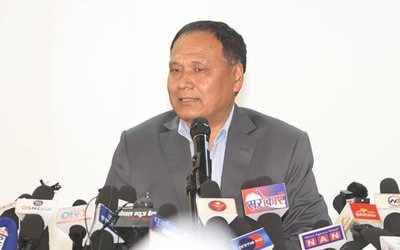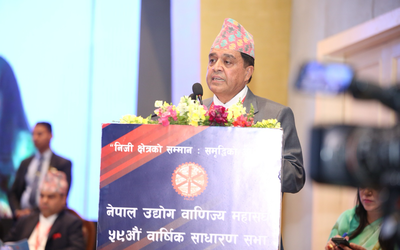
Although a group of businessmen who were defaulting to pay loans from commercial banks welcomed the amendment as the right step, economists questions the rationale of the amendment. They termed the amendment as politically motivated and taken to protect the defaulter.
Among many, the RPP leader and renowned economist Dr. Prakash Chandra Lohani were the first to question the rationality of the amendment. Dr. Lohani questioned the recent Nepal Rastra Bank decision: is Encouraging the Misuse of Borrowed Boney a "Progressive" Policy of the Finance Minister? "
Dr. Lohani's question has valid point. After meeting with Prime Minister Pushpa Kamal Dahal Prachanda and Deputy Prime Minister and Finance Minister Bishnu Poudel, Governor of Nepal Rastra Bank Maha Prasad Adhikari amended 'Working Capital Loan Guidelines, 2022' to provide benefits to the businessman.
Despite the pressure from the government, he avoided deciding in the past. Following the change of government, governor Adhikari has shown flexibility and amended the regulation.
The decision of Governor Adhikari, who took a stand against any flexibility, to amend the guidelines raised many questions. A senior leader of the Rashtriya Prajatantra Party Dr. Lohani raised the question of the decision.
"It was seen that the Rashtra Bank has introduced a policy of giving concessions even when the businessmen are doing the opposite of what they have borrowed for. Is encouraging the misuse of borrowed money to be business-friendly a "progressive" policy of the Finance Minister and the Rashtra Bank?" tweeted Dr. Lohani, former finance minister and an economist.
After the meeting with PM Prachanda and Finance minister Paudel, the Nepal Rastra Bank (NRB) has amended the 'Working Capital Loan Guidelines, 2022' implemented in October last year allowing the creditors, who have obtained the loans above the limits set by the central bank, to clear such loans in two-and-a-half years.
Now the creditors can clear the loan by mid-July 2025, repaying it in an installment of various sizes. The installments to repay the limit-exceeding working capital loans are 10 percent by mid-July 2023, 20 percent by mid-January 2024, 20 percent by mid-July 2024, 20 percent by mid-January 2025 and 30 percent by mid-July 2025.
No businesses can demand or get working capital loans beyond the limit set by the NRB and this leverage is provided to the creditors who had a portfolio larger than the prescribed size before the implementation of the guidelines in mid-October.
As per the guidelines, a firm with an estimated annual transaction of up to Rs. 20 million will get a loan of up to 20 percent of its annual turnover. However, it can obtain up to 40 percent of the annual turnover amount in special cases. The new provisions have clauses whereby the businesses seeking a such loan should submit the audit reports of the past five years and it should be utilized for commercial purposes.

The central bank has also informed us that the duration, repayment schedule and installment amount cannot be changed.
Likewise, according to the amended provisions, if any entrepreneur wanted to repay the term loan for working capital purposes, the banks and financial institutions (BFIs) cannot levy any prepayment charges. However, this provision doesn't apply in case of credit purchase or takeover, or transfer of such loans.
Private sector entrepreneurs, including their organizations like the Federation of Nepalese Chambers of Commerce and Industry (FNCCI), Confederation of Nepalese Industry (CNI), Nepal Chamber of Commerce (NCC), commodity business associations and regional chambers had been demanding the repeal of postponement of the guidelines since its implementation more than two-and-a-half months ago.
However, the central bank had been refusing to listen to their demands maintaining that the new guidelines were introduced to check the misuse of loans in unproductive sectors. Governor of the NRB, Maha Prasad Adhikari had said in September 2022 after the amendment of the guidelines a month earlier that there had been over-financing in the name of banking capital and the central bank wanted to make sure that the loan was utilized for commercial purposes.
The NRB had also said that the business persons maintaining transparency in business and utilizing the loans for the stated purpose, and ex-CEOs of the BFIs had welcomed the move.
Meanwhile, the central bank had found a middle way of extending the repayment period up to two-and-a-half years without scrapping or postponing the implementation of the new guidelines.
NRB raises loan size
However, the central bank has raised the limit of the loan size that is not covered by the provisions of the guidelines to Rs. 10 million, which was set at Rs. 5 million earlier. Likewise, the banks can mobilize loans for a 3-10 years period for permanent working capital. The period was five years earlier.
The guidelines have given the responsibility to the banks for the surprise inspection of working capital and liabilities. However, in the case of working capital of up to Rs. 50 million, a quarterly report authenticated by the customer would be valid. Before the amendment, the customers had to submit their monthly reports.
For loans above Rs. 50 million, the customer should submit a half-yearly report approved by the respective company's internal auditor.
PM talks with FM, Governor
Earlier, Prime Minister Puspa Kamal Dahal 'Prachanda' had discussed the contemporary economic issues and problems in the banking and business sector with Deputy Prime Minister and Finance Minister Bishnu Poudel and Governor Adhikari.
DPM Poudel and Governor Adhikari had reached Prime Minister's official residence Baluwatar to meet the PM, according to the Prime Minister's secretariat. During the discussion, Prime Minister Prachanda expressed his concern over the recent problems and challenges in the banking sector and read a statement issued by the secretariat.
PM Dahal stressed the need to reduce the interest rate and improve the monetary policy regarding liquidity problems and also to take other necessary initiatives.
"Due to the challenges in the country's economy, it is necessary to find ways to minimize its impact on the people stop the flow of loans to the unproductive areas and makes people well informed and aware of the country's economic status," he said.
The Nepal Rastra Bank (NRB) has amended the 'Working Capital Loan Guidelines, 2022' implemented in October last year allowing the creditors, who have obtained loans above the limits set by the central bank, to clear such loans in two-and-a-half years.
Now the creditors can clear the loan by mid-July 2025, repaying it in an installment of various sizes. The installments to repay the limit-exceeding working capital loans are 10 percent by mid-July 2023, 20 percent by mid-January 2024, 20 percent by mid-July 2024, 20 percent by mid-January 2025 and 30 percent by mid-July 2025.
No businesses can demand or get working capital loans beyond the limit set by the NRB and this leverage is provided to the creditors who had a portfolio larger than the prescribed size before the implementation of the guidelines in mid-October.
As per the guidelines, a firm with an estimated annual transaction of up to Rs. 20 million will get a loan of up to 20 percent of its annual turnover. However, it can obtain up to 40 percent of the annual turnover amount in special cases. The new provisions have clauses whereby the businesses seeking a such loan should submit the audit reports of the past five years and it should be utilized for commercial purposes.
The central bank has also informed us that the duration, repayment schedule and installment amount cannot be changed.
Likewise, according to the amended provisions, if any entrepreneur wanted to repay the term loan for working capital purposes, the banks and financial institutions (BFIs) cannot levy any prepayment charges. However, this provision doesn't apply in case of credit purchase or takeover, or transfer of such loans.

NRB addresses the private sector's demand
Private sector entrepreneurs, including their organizations like the Federation of Nepalese Chambers of Commerce and Industry (FNCCI), Confederation of Nepalese Industry (CNI), Nepal Chamber of Commerce (NCC), commodity business associations and regional chambers had been demanding the repeal of postponement of the guidelines since its implementation more than two-and-a-half months ago.
However, the central bank had been refusing to listen to their demands maintaining that the new guidelines were introduced to check the misuse of loans in unproductive sectors. Governor of the NRB, Maha Prasad Adhikari had said in September 2022 after the amendment of the guidelines a month earlier that there had been over-financing in the name of banking capital and the central bank wanted to make sure that the loan was utilized for commercial purposes.
The NRB had also said that the business persons maintaining transparency in business and utilizing the loans for the stated purpose, and ex-CEOs of the BFIs had welcomed the move.
According to the bank's sources, the central bank had found a middle way of extending the repayment period up to two-and-a-half years without scrapping or postponing the implementation of the new guidelines.
DPM Poudel said that it is necessary to create harmony between the fiscal policy of the government and the monetary policy of the central bank. "There should be a lively relationship between the Ministry of Finance and NRB, and no interventions," he said while listening to the departmental presentations at the ministry.
Whatever the reason behind the amendment, the decision will likely protect the businessmen who took the loan from the bank for one purpose and used it for another purpose. "This will support those who are misusing the depositor's money.
- NEPAL-THAILAND: Joint Business Council
- Apr 13, 2025
- BIMSTEC SUMMIT: Nepal’s Stand
- Apr 11, 2025
- IME GROUP: Expands Into Paper Industry
- Mar 24, 2025
- CPN UML: Instigated By India
- Mar 23, 2025
- ADB’S CHIEF ECONOMIST: Nepal Reduces Poverty
- Mar 11, 2025















